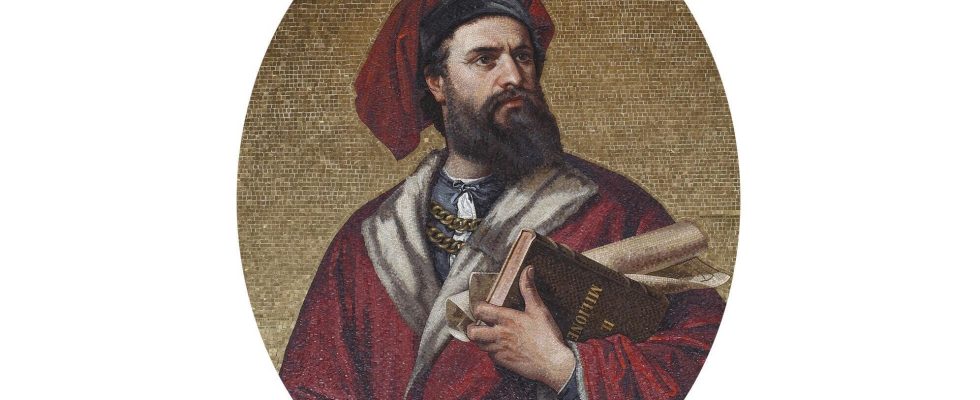If Marco Polo was not the first European to relate his journey to the Mongol Empire – Jean de Plan Carpin and Guillaume de Rubrouck preceded him – he is the first to testify to a very long permanence at the Court, which It was then moved from Karakorum to Khanbalik, present-day Beijing. Seven hundred years after his death on January 8, 1324, his story continues to question and amaze.
6 mins
What we know about Marco Polo is mainly in his book, The Motto of the world, the manuscript of which has been lost: it was dictated at the very end of the 13th century, a century and a half before the invention of printing, to the man who was then his prison companion, Rustichello of Pisa, also known for compiling Arthurian legends. The language chosen was probably Franco-Venetian, a mixture of langue d’oïl and dialects from northern Italy, a mixed dialect in use among merchants. The book, as soon as it was copied and translated, came to us in different versions, which therefore had to be cross-checked to get as close as possible to the original text.
Marco Polo was born in 1254 Venice, from a family of wealthy traders from Dalmatia. Raised by his grandfather, he found his father Niccolò and his uncle Matteo at the age of 15. They followed the Silk Road to China, where they stayed at the court of the most powerful emperor of all time, Kublai Khan, the grandson of Genghis Khan. They promised him to return with a hundred wise Christians capable of convincing him of the validity of their faith. The pope has just died, the election of a successor is pending. The Polos ended up returning to the East in 1271, this time taking with them the young Marco, aged 17. His apprenticeship will last a quarter of a century.
The previous year, the eighth and final crusade ended pitifully in Tunis with the death of King Louis IX. Italian merchants see further and their ambitions are not threatening. Arriving at Saint-Jean d’Acre, capital of the Kingdom of Jerusalem, they learn of the election of the new pope, who entrusts them with two monks – that’s quite enough for traders – who, moreover, turn back quite quickly, frightened by a such an adventure. This puts an end to all hope of conversion of the Great Khan, who takes no offense and takes Marco into his service. Doubts remain as to the exact nature of his missions at the court of Khanbalik. One thing is certain. The young Venetian traveled for five years before meeting the Mongolian sovereign and this presence, as rare as it was exotic, was not without seduction.
At the court of Kublai Khan
He stayed there for fifteen years. Since their first meeting, Kublai Khan has aged – he died in 1294 – and the Polos most likely fear seeing their fate change with his succession. Luckily, they are asked to accompany the woman who is to become the new wife of the Khan of Persia, who has just become a widower. When they set out, the Polos do not know that the promised one has just died in turn. Never mind, upon arrival at her destination, the young girl will marry the son of her late fiancé. Their mission accomplished, our travelers returned to their hometown in 1295. They were immensely rich.
The following year, Marco Polo was captured by the Genoese, at war with Venice. He was released three years later, time to write his work. “Therefore we will present things seen for sight and things heard for heard, he states in the introduction, so that our book is sincere and true, without any lie and that these words cannot be accused of fables. » To some extent, such a profession of faith would make him the ancestor of modern journalism.
This would be to ignore, of course, the embellishments of Rustichello – who likes, as we have seen, chivalrous stories -, the biblical references which in the mental universe of a 13th century Christian take the place of material truth, of ‘a tendency to grant oneself the beautiful role or to assert one’s presence in events which one was unable to witness, and finally, of a learned disorder in chronology and geography which has occupied a number of exegetes for seven centuries and historians.
“The Book of Wonders”: reportage or autofiction?
This story which mixes the real and the imaginary, the gesture of the great Khan and the beautiful legends read and heard before and during his journey, may even have made the British sinologist Frances Wood, curator at the British Library. What if Marco Polo, she writes in substance, had never gone further than Constantinople? This thesis, however, was quickly undermined, both by the precision of certain facts that he could not have transcribed without being a witness and by the Chinese archives, which mention a certain Po Lo whose missions overlap with those that he mentions in his story.
Was he, however, the reporter that his biographer Pierre Racine wanted to see in him? If it was necessary at all costs to choose a lineage on the side of contemporary literature, it would undoubtedly be better to look towards autofiction, in other words an apparently autobiographical story, but distorted by referential inaccuracies and a narrative requirement which is accommodates omissions, shortcuts or other arrangements with reality.
So Marco Polo, who rarely talks about his daily life, constantly switches from the first to the third person – is it in this second case, him or Rustichello who speaks? Leaving his reader speechless as well as incredulous in the face of this Book of Wonders, another title that is sometimes given to his work. No doubt we must grant him that in his incredible life, reality has undoubtedly surpassed fiction many times. As for his fabrications, while failing to provide us with concrete data, they also tell us the perception of the world of a 13th century Western merchant transported to an unknown world.
Our selection on the subject
To read :
To listen :

